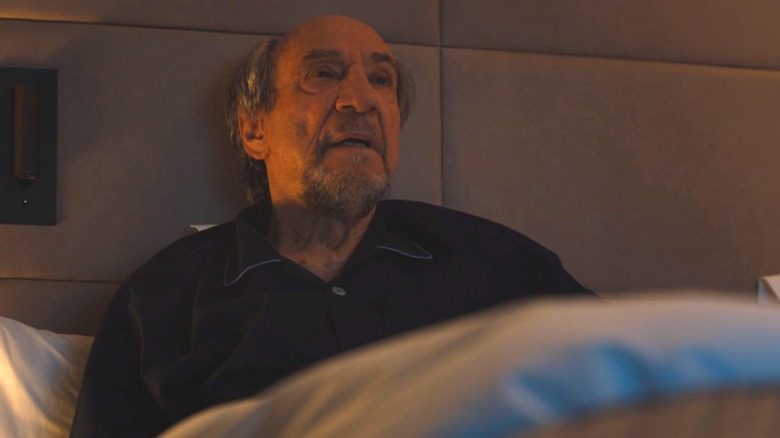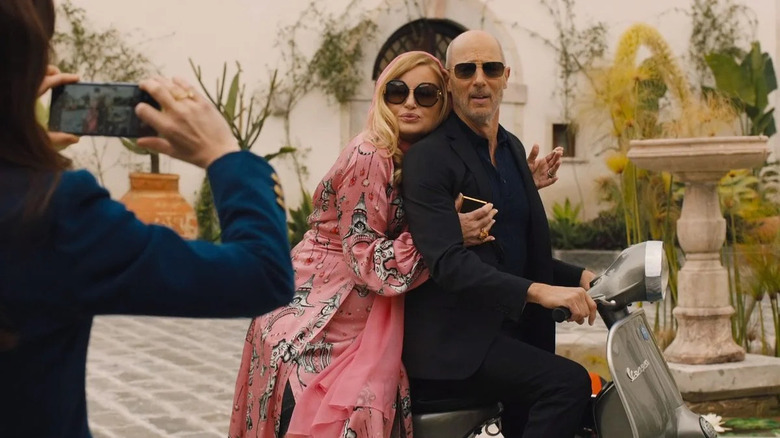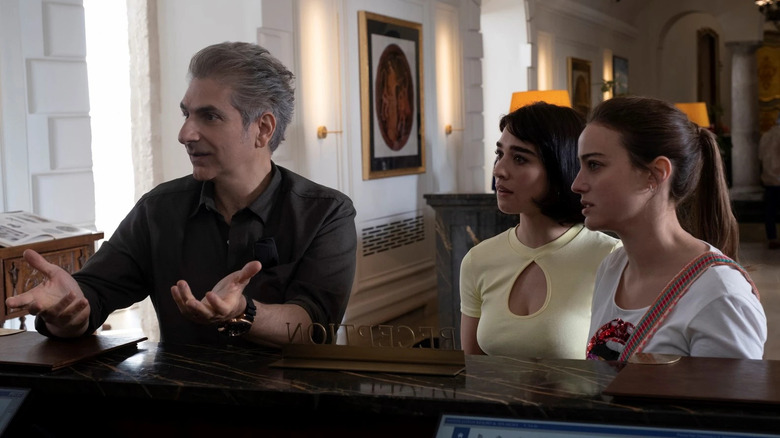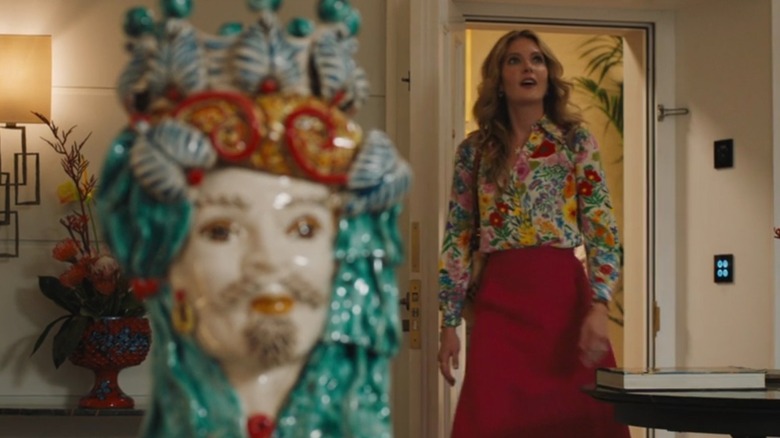The White Lotus Season 2 Sheds New Light On A Classic Line From The Godfather
Bert Di Grasso (F. Murray Abraham) has thrown himself into his ideal Sicilian experience since arriving at The White Lotus resort. He's flirted with every Italian local he's set his eyes on, enjoyed the exquisite cuisine, learned more about his family's homeland, trekked his old bones through the historical grounds of the city, and settled in for bed by watching "The Godfather" in his hotel room while his son, Dominic (Michael Imperioli), has a threesome with two Italian sex-workers half his age next door. Between the champagne cork popping, splashing of water from the indoor hot tub, and laughter of women squeezing every penny they can out of Dom, Bert hears Calò's words of wisdom to Michael Corleone become more relevant to his son's life, and thematically, the lives of all of the men in "The White Lotus."
"In Sicily, women are more dangerous than shotguns."
The politics of gender have been at the forefront of season 2 of "The White Lotus" since last week's season premiere, but show creator Mike White seems to be using the idyllic Italian setting and arguably the most iconic film centered on Italian culture to unpack the power imbalances that exist at the opposite ends of the gender spectrum. With only two episodes available, it's clear that the men of "The White Lotus" view women as dangerous beings capable of destroying their lives. But if we're going to play into the "shotgun" metaphor, that power can only be showcased if someone makes the choice to fire.
Power can only be given
In "The Godfather," the line Calò says to Michael Corleone is a reference to the way women occupy a vital space in the power hierarchy of organized crime. Women, by proxy of prison visits as wives or mothers, are often the only people that are able to speak directly with imprisoned mafia members. This means these women are the ones who continue carrying out orders and have a direct say in what information is typically provided to the legal representatives trying to get those men out of the slammer. The line is meant to be empowering by indicating that women are just as powerful as the men who serve as the "face" of organized crime, but neither "The Godfather" author Mario Puzo nor film director Francis Ford Coppola has actually broken down what this line really means.
Fortunately, the same guy currently writing "Despicable Me 4" is putting in the work through "The White Lotus."
The women of "The White Lotus" have all been introduced as the dominant figures in their lives. Tanya McQuoid-Hunt (Jennifer Coolidge) made her husband Greg (Jon Gries) sign a prenup, and can leave him with nothing if they divorce. "The White Lotus" resort is run by Valentina (Sabrina Impacciatore), who has more power than anyone else on staff. Harper Spiller's (Aubrey Plaza) feelings about her husband and his friends dictate the enjoyment of everyone's vacation. Daphne Sullivan (Meghann Fahy) may appear like a doting wife but effortlessly warns her husband that she could "cut off his balls" if she felt like it. Mia (Beatrice Grannò) and Lucia (Simona Tabasco) gleefully drain Dom of his vacation funds, and Portia (Haley Lu Richardson) has Dom's son Albie (Adam DiMarco) captivated without even trying.
None of these women asked for the power they have, but it was given to them with ease by the men that surround them.
Be smart enough to use the power
Tanya McQuoid-Hunt has been painted as a daffy socialite since the first season, but her assistant Portia breaks her non-disclosure agreement and tells Albie how Tanya gained her fortune. Our emotionally damaged millionaire appears to have inherited hush apology money from her wealthy father after what is implied to be a history of sexual abuse. This so-called financial "power" she now has over her husband Greg was given to her at the expense of her own healthy childhood. Meanwhile, Ethan Spiller (Will Sharpe) watches porn in secret because ... I don't know, "feminism," I guess? Dude, if you're gonna jerk it while not boning your wife, just own it.
As sex workers, Mia and Lucia's interactions are purely transactional, and Dominic has the ability to say "No," at any point. Even after he tells the girls "I'm a sex addict and I'm trying to get my life in order," he eventually gives in and invites them into his hotel room. That's a choice he's made, and quite frankly, the duo is under no obligation to serve as the moral arbiters of his decision-making. Get your bag, ladies.
Portia has become the unofficial third member of the Di Grasso family on their fancy Sicilian pilgrimage as she tries to stay clear of Greg's line of sight, which has inadvertently made her the object of Albie's affections. In a desperate attempt to not become a philandering womanizer like his father (and Nonno Bert), he's instead become a "nice guy," who admits that he's attracted to women he describes as "pretty, wounded birds." Ah, good, we have a textbook example of a man terrified of women who know that they are as powerful as shotguns, knowing full well he'd willingly fire away while staring down the barrel.
The constant threat of the Testa di Moro
"The White Lotus" has embedded the exploration of gender dynamics into the fabric of the world, with references to myths and legends about women forced to endure harm at the hands of the men who claimed to love them. Each room includes busts based on the Testa di Moro, which tells of a woman who beheaded her lover after learning he was cheating on his wife with her. Some historians explain the beheading as a way for the woman to permanently keep him from leaving her, while others view it as a sign of not only her disgust at his behavior but also a way to honor the other woman in the equation that he wronged in the ultimate act of, "Don't worry, girl, I already took care of that a-hole."
I tend to believe the latter, as the former shares a similar sanitized energy as the historians who thought poet Emily Dickinson and Susan Gilbert were "just friends."
It's refreshing that "The White Lotus" not only presents the famous shotgun simile of "The Godfather" as a conceivable motto for all of the men in the show but is also genuinely willing to unpack what the phrase actually means for the women at its center. Women are all too often described in metaphorical language as a way for men to try and make sense of the "fairer gender" between one another, seldom recognizing their own participation in how this language genuinely functions in real life.
If you want to believe that women in Sicily are more dangerous than a shotgun, so be it, but remember that only one person can have their finger on the trigger ... and it certainly isn't the gun herself.



